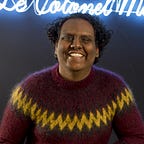Bigger than us
I’ll never forget the feeling of shame and unease I experienced shopping in ready-to-wear shops in my childhood and teen years. Having so little items that could fit me made me feel like a whale. I’ve always been chubby. Kids clothes would be too tight, so my mum had to buy me men clothing, including carnival costumes. I now avoid stores and shop online from my desk. I freed myself from the clerk’s arrogance or kind embarrassment when saying “Sorry sir. We don’t have it in XXL”.
The irony is that I chose to work for the industry, which excluded me from its stores! I’ve worked in shops where none of the shirts would fit me. I’ve attended shows during Paris Fashion Week where because my bum was taking the bench space of two people, I would stand up, feeling mortified. I spent hours in offices surrounded by people who did not look like me. But still, I kept fighting to prove to everyone that I deserved a seat at the fashion table. I did struggle, but it made me a better worker and person because I turned these scars into talent through hard work.
“I was in the main office with the fashion features team, and they were all beautiful, sample size and white, it kinda dawned on me that this was a challenge. I was the anomaly” confines Stylist journalist Billie Bathia over the phone. She has experienced being the only fat person in the room too. And she felt excluded not only by the clothes she wrapped in the cupboard but also by her model-sized peers.
American designer Ashley Nell Tipton knows a thing or two about exclusion from her teen days as well. “As far back as I can remember. I had minimal options. There was nowhere for me to shop.” Same story for Brazilian designer student Karoline Vitto from the Royal College of Art: “I was, and still am, on that mid-size edge. As a size 16/18, there are not that many options. (…) I used to wear my mum’s clothes a lot, and I still do”.
These two designers have never met, but they inherited their passion for clothing through their family. Ashley learned to sew with her grandmother while Karoline’s grandparents were respectively a talented sewer and a shoemaker. She writes to me that she “had jumpers and coats that were in the family for at least two generations”. The fashion industry may have rejected these two, but they built a connection to garments through love and memories. This deep relation to fibres and needles led Ashley Nell Tipton to won season 14 of Project Runway in the US with the first plus-size final collection.
In London, Karoline intrigued Dazed and Vogue Italia with her graduate collection. Her motto? Emphasizing our love handles, back rolls and thick thighs with shiny metal pieces sewn into her garments. Forcing the wearer and anyone else to accept it celebrating it. When I wonder why she answers very genuinely. “I wanted to bring body diversity into my work because it was my truth. I was going through a personal process of finding myself. Being able to wear my pieces was something that had always been in the back of my mind.”
Stronger from every scar
Ashley Nell Tipton, at first, also wanted to design clothes that she could wear. In her journey, she mastered the art of creating for curvy bodies, and she did not stop at this category, she decided to opt for inclusive fashion for everyone. “I have chosen to create for my market, she writes, but I don’t think our size should limit us. I have just signed a contract to create a couture line inspired by my Project Runway final collection. In all sizes! (…) Every day is a new challenge, and I love that”. Her struggles made her a better designer in the end. “Most people in the industry, if not everyone, will face different types of difficulties and will have different kinds of skills and backgrounds to bring to the table” ads Karoline Vitto. Ashley may not look like the designers who surrounded her during the TV show, but she won. Your looks say little about your abilities, or as Billie Bathia tells me: “An appearance is just the label, it is nothing. It has no impact on how talented you are, how dedicated you are, how skilful you are”. And the London based writer knows all about this since she has become one of the most known faces of Stylist Magazine. She is being featured regularly in the publication in pictures and text using her voice to raise awareness on the need for more inclusive fashion in this industry. What made her uncomfortable once upon a time, is now her asset.
As Karoline analyses it: “I think if you have any insecurities and can translate that into art, design or any form of expression, that is super powerful. It not only helps you deal with your struggles, but it also touches people, and sometimes it makes a difference in their lives too.”
Today, I write about how it’s wrong that the clothes I see on shows will never fit me. My passion for fashion will always be bigger than the memories of shame and unease.
This essay was originally written for the British Vogue Talent Contest 2019.
